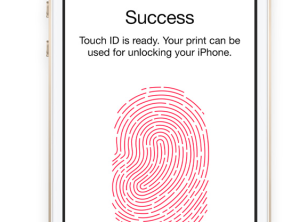Did These Hackers Just Win $20K, Booze & A Dirty Book By Beating Apple’s Touch ID?
Someone — or, as it turns out, a number of someones — might be the proud new owner(s) of a couple books, a bottle of wine and another of bourbon and oh yeah, around $20,000 in cash after a hacker group claims to have beaten Apple’s new fingerprint scanner, Touch ID. This, just a few days after the iPhone 5S descended on the public.
The Chaos Computer Club — or CCC — announced yesterday (via Mashable) that it had performed a successful hack and tricked the fingerprint reader on the new iPhones using laser printing to fake fingerprints.
A hacker broke the security authentication system with technology he’d developed in 2004. He reportedly just had to make a few tweaks to the laser printing technology to crack the code.
“In reality, Apple’s sensor has just a higher resolution compared to the sensors so far. So we only needed to ramp up the resolution of our fake,” the hacker said in the announcement. “As we have said now for more than years, fingerprints should not be used to secure anything. You leave them everywhere, and it is far too easy to make fake fingers out of lifted prints.”
In addition to outlining the process down to each step, resulting in a fake fingerprint made of thin latex and breathed on to make it more live and fingerlike to the touch, the group could be in line to win a hefty amount of cash and loot from the creators of istouchidhackedyet.com.
The answer on that site, as of this writing is: Maybe. The group says it has to see more evidence, including a video of the entire hacking process.
Check out the YouTube video below by the CCC showing the apparently successful hack:
Chaos Computer Club breaks Apple TouchID [CCC.de]
Hackers Claim to Crack Apple’s Fingerprint Scanner [Mashable]
Want more consumer news? Visit our parent organization, Consumer Reports, for the latest on scams, recalls, and other consumer issues.


